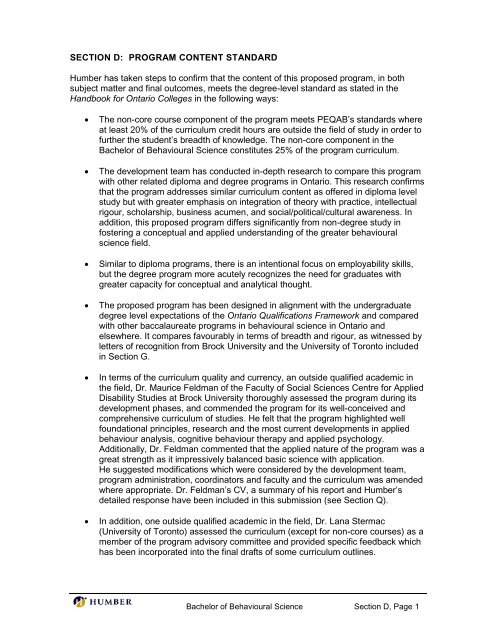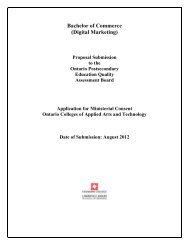Bachelor of Behavioural Science - Postsecondary Education Quality ...
Bachelor of Behavioural Science - Postsecondary Education Quality ...
Bachelor of Behavioural Science - Postsecondary Education Quality ...
You also want an ePaper? Increase the reach of your titles
YUMPU automatically turns print PDFs into web optimized ePapers that Google loves.
SECTION D: PROGRAM CONTENT STANDARD<br />
Humber has taken steps to confirm that the content <strong>of</strong> this proposed program, in both<br />
subject matter and final outcomes, meets the degree-level standard as stated in the<br />
Handbook for Ontario Colleges in the following ways:<br />
<br />
<br />
<br />
<br />
<br />
<br />
The non-core course component <strong>of</strong> the program meets PEQAB‘s standards where<br />
at least 20% <strong>of</strong> the curriculum credit hours are outside the field <strong>of</strong> study in order to<br />
further the student‘s breadth <strong>of</strong> knowledge. The non-core component in the<br />
<strong>Bachelor</strong> <strong>of</strong> <strong>Behavioural</strong> <strong>Science</strong> constitutes 25% <strong>of</strong> the program curriculum.<br />
The development team has conducted in-depth research to compare this program<br />
with other related diploma and degree programs in Ontario. This research confirms<br />
that the program addresses similar curriculum content as <strong>of</strong>fered in diploma level<br />
study but with greater emphasis on integration <strong>of</strong> theory with practice, intellectual<br />
rigour, scholarship, business acumen, and social/political/cultural awareness. In<br />
addition, this proposed program differs significantly from non-degree study in<br />
fostering a conceptual and applied understanding <strong>of</strong> the greater behavioural<br />
science field.<br />
Similar to diploma programs, there is an intentional focus on employability skills,<br />
but the degree program more acutely recognizes the need for graduates with<br />
greater capacity for conceptual and analytical thought.<br />
The proposed program has been designed in alignment with the undergraduate<br />
degree level expectations <strong>of</strong> the Ontario Qualifications Framework and compared<br />
with other baccalaureate programs in behavioural science in Ontario and<br />
elsewhere. It compares favourably in terms <strong>of</strong> breadth and rigour, as witnessed by<br />
letters <strong>of</strong> recognition from Brock University and the University <strong>of</strong> Toronto included<br />
in Section G.<br />
In terms <strong>of</strong> the curriculum quality and currency, an outside qualified academic in<br />
the field, Dr. Maurice Feldman <strong>of</strong> the Faculty <strong>of</strong> Social <strong>Science</strong>s Centre for Applied<br />
Disability Studies at Brock University thoroughly assessed the program during its<br />
development phases, and commended the program for its well-conceived and<br />
comprehensive curriculum <strong>of</strong> studies. He felt that the program highlighted well<br />
foundational principles, research and the most current developments in applied<br />
behaviour analysis, cognitive behaviour therapy and applied psychology.<br />
Additionally, Dr. Feldman commented that the applied nature <strong>of</strong> the program was a<br />
great strength as it impressively balanced basic science with application.<br />
He suggested modifications which were considered by the development team,<br />
program administration, coordinators and faculty and the curriculum was amended<br />
where appropriate. Dr. Feldman‘s CV, a summary <strong>of</strong> his report and Humber‘s<br />
detailed response have been included in this submission (see Section Q).<br />
In addition, one outside qualified academic in the field, Dr. Lana Stermac<br />
(University <strong>of</strong> Toronto) assessed the curriculum (except for non-core courses) as a<br />
member <strong>of</strong> the program advisory committee and provided specific feedback which<br />
has been incorporated into the final drafts <strong>of</strong> some curriculum outlines.<br />
<strong>Bachelor</strong> <strong>of</strong> <strong>Behavioural</strong> <strong>Science</strong> Section D, Page 1
















